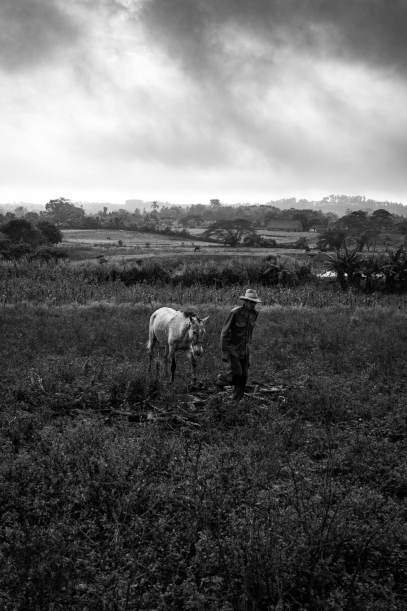
A four year documentation of the Campesino people and culture of rural Cuba. Campesino means "farmer" or "rural peasant" and includes some of the most poverty stricken populations on the island. They number close to 20 miliion and occupy close to 85% of the land in Cuba. Whereas most coverage of Cuba consists of Havana or other major cities, this project aims at spending time with those most often unseen or unspoken of, those who make up the agricultural backbone of the nation, and the families intertwined within.
In early 2016 I began documenting the disappearing agricultural practices of the Campesinos, the most isolated and rural people of Cuba. The need for the project arose from a major encroaching issue:
With the opening of American tourism in 2015 (bringing with it cash and technology) the way of life for the Campesino was set to evolve at a historic pace. I sought to record the ancient farming techniques of those who for over 150 years have survived solely by the fruits of their labor, on land and sea, mostly without electricity or modern tools.
Beginning in 2017 though, the Trump Administration returned to a more traditional, hard-line approach to Cuba, with dangerous rhetoric resurfacing in diplomatic communiques between the two nations. In addition, opportunities for Americans to explore the island and get to know the Cuban people up close were again greatly reduced, with newly placed restrictions on travel requirements and accommodations. After the evacuation of nearly all U.S. Embassy diplomats in 2018, it only regressed further, returning back to the old familiar stalemate between the two nations. These events forced me to reassess my goals there back in 2019.
Campesino Cuba, as a project, and as a book being released this Fall 2021, focuses on a greater search of unifying, underlying truth between all people. With the increased tightening from both sides, the conversation has repeatedly reached political stagnation, cutting out once again, any chance for the human connection to be established between citizens of the U.S. and mainland Cuba. A return to hostility is an injustice to those who suffer most under it, as seen with almost six decades of a crippling economic and political embargo towards an already isolated population, both physically and politically. The poorest are flanked on both sides, stuck in the middle, between two competing narratives that refuse to accede the upper hand. Simply put, the Campesinos just want peace and access to food and medicine.
I am not interested in documenting the political struggles or environment of urbanized Cubans, as that has been and continues to be covered. The prolonged economic strife imposed on the most vulnerable requires an up-close coverage on an ethical, humanistic level, and demands the subjects be given an equal playing field on the universal platform of life and human dignity.
I believe the camera is a sacred instrument, which simultaneously holds the humility of an anvil as well as the power of a hammer. The documentation of history and the empathetical process have been the main drivers for my work, both in learning and in showing, since 2006. Even though Cuba has been covered extensively, it has mainly been in the cities. I wanted to find the unseen Cuba, the rural Cuba, as I believe most true identities of nations come from those who live off of the land, and can speak to such history.
Richard Sharum
richard.andrew.sharum@gmail.com
www.richardsharum.com
@richard_sharum
+1 972.951.7448
Make Comment/View Comments